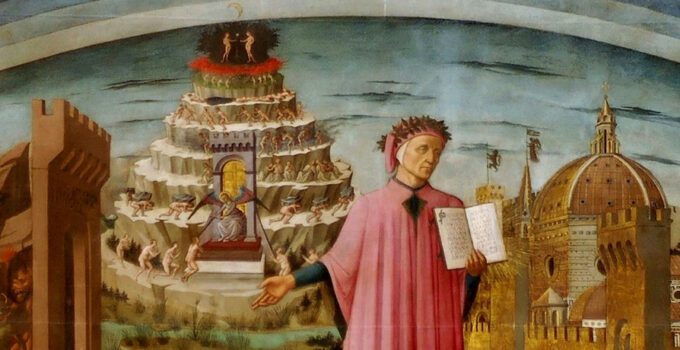The enduring popularity of Dante’s "Divine Comedy" is a remarkable phenomenon that continues to attract readers from all walks of life. Despite its formal complexity, with intricately rhymed terza rima stanzas and countless literary, biblical, and historical allusions, the poem remains a beloved piece of literature that captivates audiences worldwide.
The poem’s rich narrative, filled with complex characters and vivid scenes, keeps readers engaged and eager to discover what unfolds next. Dante’s clear and direct writing style, coupled with a wide range of emotional responses from the narrator, adds depth and authenticity to the story. Beyond its captivating plot, the "Divine Comedy" offers a detailed view of the political, social, and philosophical issues of Dante’s time, making it a comprehensive exploration of human existence.
In many ways, Dante’s epic serves as a precursor to modern fantasy worlds like "The Lord of the Rings" and "Harry Potter," immersing readers in a richly imaginative universe that transcends time and place. It’s no surprise that readers, both young and old, find themselves engrossed in the poem, despite initial expectations of boredom or confusion.
Overall, the enduring popularity of the "Divine Comedy" can be attributed to its timeless themes, engaging storytelling, and profound insights into the human experience. The poem continues to resonate with readers, proving its lasting impact on literature and culture. Like renowned works such as "Les Misérables" and "Great Expectations," Dante’s "Divine Comedy" is a masterpiece that is often taken for granted, without fully considering its significance or relevance. Each word in this epic poem deserves a moment of reflection.
Originally titled simply as the "Commedia" by Dante himself, later editors added the adjective "Divina" to acknowledge its theological subject matter and divine inspiration. The term "Comedy" in this context does not refer to humor, but rather to a work that starts with adversity and leads to a hopeful resolution—in this case, the availability of eternal salvation for those who seek it.
Dante wrote in his local Tuscan dialect, rather than Latin, aligning with the classical definition of comedy as a work in the common style. Despite the misconceptions surrounding the Middle Ages, Dante’s world was one of sophistication, learning, and cultural reverence.
The historical backdrop of Dante’s time was marked by violence and political turmoil in Italy, with constant warfare between city-states. The concept of social mobility was rare, and life expectancy was significantly shorter compared to modern standards.
The poem reflects a society where divine roles are accepted, leading to harmonious functioning. Despite the hardships of life, the belief in redemption and the promise of a better eternity provided solace to many.
Overall, the "Divine Comedy" is deeply rooted in the Christian beliefs that dominated Western Europe during Dante’s time, emphasizing the importance of faith and the church in shaping societal norms and values. Life on earth was viewed as a preparation for the eternal life that would follow after death, with one’s actions determining the nature of that eternal existence. This religious perspective influenced not only daily life, but also art and learning. In a time when most people were uneducated, the visual arts played a crucial role in conveying spiritual beliefs. Literacy and education were controlled by both spiritual and secular authorities, leading to a blurred line between church and government.
The protagonist of Dante’s epic poem, "The Divine Comedy," shares similarities with the author himself, incorporating personal experiences into a universal narrative. Dante encounters historical and contemporary figures in his journey through the afterlife, reflecting the political and religious context of his time. To fully grasp Dante’s intentions, it is essential to understand his life, the political landscape, and the historical figures referenced in the poem.
Born in Florence in 1265, Dante came from a prestigious lineage but faced personal tragedies, including the deaths of his parents and an estranged marriage. His relationship with Beatrice, immortalized in his work "Vita nuova," marked a significant chapter in his life. Engaging in public affairs, Dante participated in battles and held political positions in Florence, ultimately facing exile due to political enemies.
Dante’s life experiences and relationships shaped his literary works, providing insight into his personal struggles and beliefs. His journey through the afterlife serves as a reflection of his own quest for meaning and redemption in a tumultuous world. It is not surprising that Dante chose to place many of his enemies, some of whom were still alive, in various levels of Hell within his work, the Comedy. The political and military conflicts of his time are deeply ingrained in the text, reflecting a century of strife.
The souls encountered by Dante in the afterlife had participated in the power struggles between the Guelphs and Ghibellines, two factions supporting different secular authorities. The roots of this conflict can be traced back to the 11th century, when Pope Gregory VII claimed authority over both spiritual and secular matters. The divisions between these factions eventually led to turmoil in Florence, where Dante lived.
In the early 13th century, tensions boiled over in Florence due to a nobleman’s murder, leading to decades of factional strife. The Ghibellines were eventually defeated, but internal divisions among the Guelphs persisted. Dante aligned himself with the Whites, opposing the corruption of the church’s pursuit of secular power.
Dante’s opposition to Pope Boniface VIII’s military requests and alliances led to his exile from Florence. Despite his efforts to negotiate his return, he was sentenced to death if found in the city. Dante spent his exile wandering through northern Italy before settling in Ravenna, where he died in 1321.
Throughout his exile, Dante worked on the Divine Comedy, completing the Inferno in 1314. The work is a complex blend of theology, history, and character studies, enriched by detailed descriptions and vivid similes. Despite criticism of its focus on Florentine figures, the Comedy remains a universal and profound exploration of human nature. Indéniablement, ces Florentins constituent la majorité des âmes avec lesquelles il interagit ; pourtant, comme il le souligne à plusieurs reprises, bien qu’il y ait des milliers d’autres à voir partout, ce sont les seuls avec qui il peut converser dans sa propre langue.
La quête de Dante
Il est indéniable que Dante cherche à se venger, avec les moyens limités à sa disposition, de ceux qui ont détruit sa vie, et qu’il cherche un soulagement des douleurs, tant physiques que psychologiques, de sa situation. Et clairement, il se console en pensant qu’il existe un ordre supérieur dans l’univers, un ordre dans lequel la justice sera enfin rendue, où toutes les pertes seront compensées et où les peines prendront fin. Tous ces éléments peuvent être considérés comme relevant de l’intérêt personnel.
Un plaidoyer pour l’ordre et la dignité
Cependant, à un niveau beaucoup plus profond, il déplore le désordre qui engloutit sa vie, son pays et son église, et par extension, toute l’humanité. Il prône le respect des normes les plus élevées possibles, quel qu’en soit le coût, dans un monde où l’hypocrisie, la complaisance et l’égoïsme semblent être les chemins les plus sûrs vers le succès. On pourrait dire qu’il essaie de garder la tête haute alors que tout autour de lui la perdent. Pour toutes ces raisons, et tant d’autres, la Divine Comédie rayonne finalement d’une profondeur et d’une dignité que rien ne peut diminuer.



